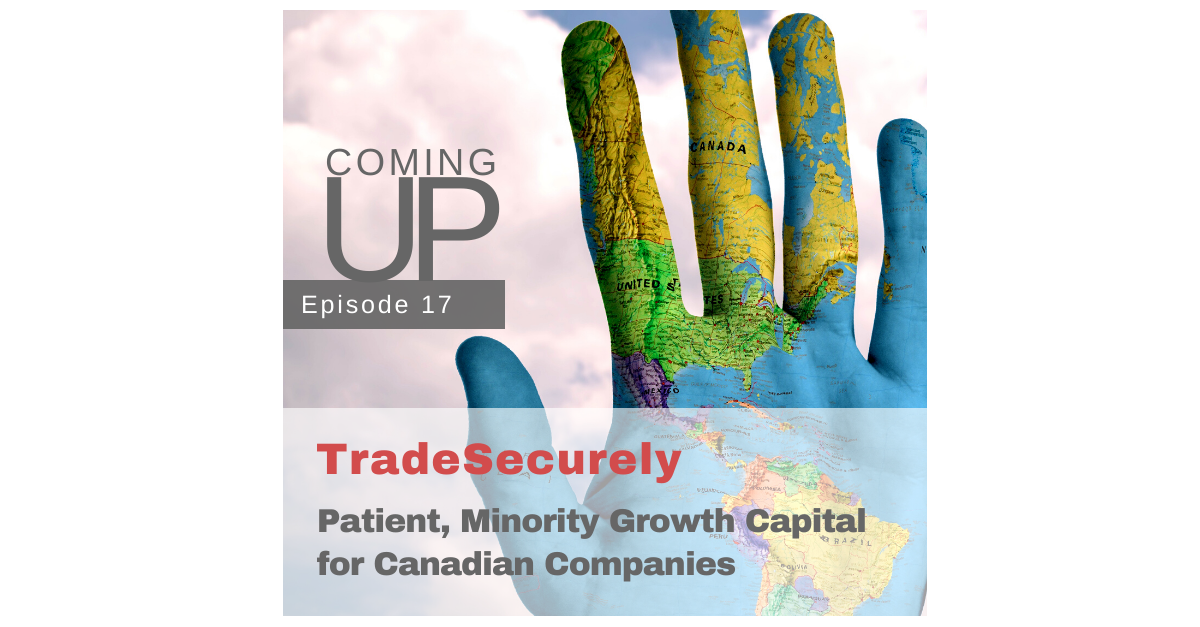Speaker 0 00:01 <inaudible>.
Speaker 1 00:03 Welcome to the trade securely podcast. I'm Janet Eastman and this week on the show we continue to get the basics on receivables insurance. This type of insurance has been used in Europe for over a hundred years, but it's only been <inaudible>
Speaker 2 00:17 available in Canada for about a quarter of that time. Many Canadian businesses are unaware of it, so we're trying to explain it in order to help Canadian businesses trade and grow securely and compete on the global stage today my guest is Mark Hall. He's associate broker and credit insurance specialist at Dan Lowry insurance as well. He's a member of the receivables insurance association of Canada. He's been involved with credit insurance either buying or providing it for the last 20 years as a specialist. He guides companies through the process of determining what kind of policy they require, the most appropriate insurer for their needs and then supporting those businesses as they evolve over time. Mark, thanks very much for joining me today. Pleasure to talk to you.
Speaker 3 01:00 Good to talk with you, Janet.
Speaker 2 01:01 So Mark, you came to receivables insurance after being a credit manager at a high tech electronics company. So tell me how you first came aware of receivables insurance.
Speaker 3 01:14 Well, back in the early 1990s, our firm was on track to go public and as part of the process we had to comment on the risks involved with the business so bad. That was something that we could not prevent without giving up sales growth. As there were no barriers to entry, we put an accounts receivable policy in place to act as a stop loss so that the earnings per share when we went public, we're not effected negatively. And also to enhance our bank financing where we were able to margin our accounts receivable at 90% and not the standard 75%.
Speaker 2 01:54 Okay. So were you aware of receivables insurance as a credit manager <inaudible> to you? Yeah, yeah. Explain that part. To me
Speaker 3 02:05 it was a brand new product for me. Um, something I had not heard of, but um, we became aware of it when our bank suggested we pick a look into it, uh, to enhance our financing. But that's how we came. We became aware of it.
Speaker 2 02:21 Yeah. Okay. So then you were with the electronics firm. What prompted you to actually move over to the receivables insurance business at and start providing that advice to people?
Speaker 3 02:33 Well, in 1998 after a very expensive and failed foray into the U S our company was in trouble and it looked like we were going to be sold to one of our us counterparts. Obviously when the sale took place, uh, my job was going to become redundant. So I looked for another place to go and an opening with an accounts or an accounts receivable broker at the brokerage that we were buying from. And uh, I've been there ever since.
Speaker 2 03:09 Okay. So you actually purchased the product, saw the value in the product and eventually came over to the team. So, I mean, you must have, you understood the product really well so you could walk right into that job. So when you're helping people investigate the possibility of purchasing a receivables, insurance policy, I mean, what do you say they need to prepare prior to actually getting into that meeting with the, the receivables insurance specialist?
Speaker 3 03:39 Well, it's very important, uh, to relate to the specialist. The type of business they're in. Is there, is it a high volume, low margin business like where I came from? Is it, especially manufacturing business with a few large orders per month, you know, is their concentration of sales among just a few customers? Do you have international sales or are they domestic? And where is your sales growth going to come from in the future? Um, and the last thing we really need to talk about is, you know, what are your credit procedures in house? And in a lot of cases people really don't have any, and this is where one of the benefits of the product it comes up because it actually gives them some direction as to what they should be doing about their own credit management in house.
Speaker 2 04:31 <inaudible> so are you saying that from your perspective, a lot of companies are doing business without some sort of credit management process?
Speaker 3 04:41 Well, a lot of it is driven by, you know, top line sales. Just how much sales can we make and how much money can we make, uh, out of doing that. Um, they don't regard Mmm. Granting credit as a science. Like it really should be. There's facts involved in analyzing customers and uh, you should be doing that. So for the most, most companies in the small and medium sized business, they're happy with the sales and you know, they just do their best to collect on those sales
Speaker 2 05:18 so they're not really peeking under the covers when they get into like to get into business with somebody. Wow. Okay. So what does this preparation, if they, if they've figured out what their process is, they're ready for the meeting, how important is that preparation for you when you walk in? Like you can get a pretty good overall picture right away, can't you?
Speaker 3 05:39 This is such an important step for the specialist broker is understanding the nature of the business will help determine which insure is the best fit for them, what type of policy they should have, what endorsements should be added to the policy and it all has to best the needs of the client. And last you. Lastly, you must be able to tell the insurer why this client is going to be a good fit for them.
Speaker 2 06:06 <inaudible> so you just said a word that I'm not sure what it means. So what do you mean when you say endorsements?
Speaker 3 06:12 Well, you can add S particular in endorsements or or issues to the policy to help protect certain aspects of the business. Mmm. It's just not a standard, uh, uh, blank piece of paper with uh, you know, your listing of your coverage. There are various things that you can add that will help protect the individual business from losses that they hadn't even thought about it.
Speaker 2 06:42 Yeah, I guess, well, not every business is the same, so not every policy fits every company. So I guess these endorsements then help you modify a policy to actually suit your business?
Speaker 3 06:53 That's correct.
Speaker 2 06:54 Yeah. Okay. So after this, shouldn't this initial meeting with the, the credit insurance specialist, what happens, how long does that process meet? What happens behind the scenes with you?
Speaker 3 07:06 So once we've established a genuine interest in the product, we have to complete an application and submit it to the insurers that are best suited to the client. 10 to 12 insurers currently in the Canadian marketplace. And but not all of them are most appropriate for every business. It takes approximately two weeks to see quotes generated once the application is submitted and once all the quotes are received, we put the details into a spreadsheet where you can see the policy terms and conditions side by side as well as you can see how successful the insurers are in providing coverage on the client's top accounts. From there, we narrow the list of possible term possible insurers to one or two. We make some adjustments if needed and then we pick the best insurer that meets the needs of the client.
Speaker 2 08:06 Okay, so I guess this is where the, the the credit insurance specialist, that specialist broker is really valuable because what you just said is there's 10 or 12 of insurers out there, but when you're listening to a client and their needs, you know in your head basically who would be the top two, three or four insurers to meet that business's needs, right?
Speaker 3 08:31 That's correct. It's, it's, it's important too to not waste anybody's time in this whole process. You want to get to the bottom line with a particular insurer as quickly as possible so that, uh, you can get the coverage in place.
Speaker 2 08:51 <inaudible> so we talked about endorsements, but there are many policy options. So let's talk just a little bit about the flexibility of policy creation.
Speaker 3 09:01 So there, um, you know, based on this, the discussions we have with the client, there are many ways to construct a policy to better meet the needs of the client. So you can potentially ensure all of the credit sales that you make from your business. That's called whole turnover. It's the most popular type of policy, uh, in the market. And, uh, most people usually sign up for that. But you can, uh, at times just ensure a single customer or a single debtor, um, out of your portfolio. It's more difficult to do as it must meet minimum financial ratings and premiums are usually a little more than a, than a whole turnover because of a lack of spread of risk. But it can be done. And then you can ensure, um, a clearly defined set of clients in your AR portfolio. Um, you know, it could be something like only insuring your export business. It could be ensuring just your top 10 accounts or it could be insuring just a specific industry, uh, one of many that you may be selling into. So depending on what we we've discussed previously, um, it may be recommended that we do want to BS types of policies.
Speaker 2 10:29 Okay. So how long does it generally take to go through the whole policy process? You said you have that initial meeting. Um, the broker specialist goes away. It takes about two weeks to generate, um, some options as far as insurers. But from start to finish, from that first meeting to actually having a policy in place, how long can that take?
Speaker 3 10:50 Well, it's totally dependent on the customer, uh, but if we decide that we're going to go forward, they complete the application with or without my help. Um, that usually takes, you know, a week to do, uh, sometimes quicker and sometimes longer. Then it takes two weeks for us to generate, uh, to get the quotes back from the insurance companies. And then we have another meeting with the client, uh, to go over the spreadsheets that I talked about previously, to see who we can narrow, uh, the offerings down to. And then once we've done that, um, it's up to the client to make a decision, uh, when to go forward so it can take as little as two to four weeks, um, and it can take, uh, upwards of a year to get it done depending on what the client really wants to do.
Speaker 2 11:46 Okay. So could you share a story with us about how receivables, insurance or credit insurance has helped a client of yours?
Speaker 3 11:53 Absolutely. Um, one of my clients, uh, is in the transportation business and they, they are especially trucking company that, uh, that haul, uh, steel from steel mills to car manufacturers and things of that nature. Um, they were asked by their new banking partner, uh, to get a, an accounts receivable insurance policy so that it could secure their accounts receivable a little better. Um, they had the policy for about four years and every year, uh, they had to justify the expenditure on the accounts receivable premiums and versus what the benefit was to the, to the bank. Um, and then after, like I said, about four and a half years, their largest customer, uh, was us steel Canada filed for bankruptcy protection. They were owed in excess of $850,000. And this, if, if they hadn't had the protection, it could have bankrupted them within three to four months as that loss of cash flow, a loss of cashflow would, would just cripple them. They wouldn't be able to pay their employees, they wouldn't be able to put gas in their trucks. Um, you know, they, they, they couldn't operate. So the insurer paid out about 85% of what was owed, uh, as per terms of their policy. And, uh, they were able to continue on. And in actual fact, they kept on doing business with us spiel while they were in bankruptcy protection, and eventually that company was sold and they still continue to do business with the successor company.
Speaker 2 13:47 Wow. Wow. That's quite a story. So this is a four year relationship with you hat you had with them. Up until that point, there were no problems. Was there anything that you saw coming on the horizon that you indicated to them, you know, that there might be a problem with this company? I know that there are some businesses where, you know, you can see from far away that there could be some issues with a particular business. Um, I don't know whether in in U S deals case or not, but I know that brokers usually or can sometimes give a little bit of a warning to their client and say, okay, just keep an eye on this company because there appears to be problems on the horizon for them.
Speaker 3 14:30 In most cases, we do see, uh, we, we do get information from the insurers who are monitoring, um, you know, thousands of accounts out there that they're seeing some negative information, uh, calming about customers. And we then pass that on to our clients who have policies and uh, and help them either reduce their exposure or work their way out of an account before they actually suffer a loss. In the case of U S steel, it was a complete surprise to just about everybody, uh, the industry, the insurer, the customer, nobody saw it coming and it just appeared in the newspaper, uh, one day. And uh, <inaudible> eventually, you know, we all found out that this was a technical way for us spiel whose parent in the U S is quite strong to extricate themselves from a situation that they weren't exasperating. Exactly. Successful in Canada. Yeah. It was kind of the similar to the way a target in Canada filed for bankruptcy. They weren't successful here in Canada and wanted a way out and bankruptcy protection afforded them the ability to extricate themselves from us.
Speaker 2 15:55 Right. So I guess the role of the broker once that policy in place never really ends. If you're a specialist broker, when you're doing business with a company, if there are problems that are coming or if there are things that you see in the industry, you're, you're in touch with that client. It's not like sign the policy, see you later. Right
Speaker 3 16:16 now we're in touch with the policy all through the policy period. Um, whether it's just doing their monthly reporting, um, whether it's watching to see whether they are adding new customers to their policy or you know, whether wherever they might be having an issue with it, their policy, we're constantly in touch with them. Mmm. Some more than others. Some need more help than others. Uh, but it's always something that would, that we're on top of to make sure that the policy is driving the most benefit possible for our clients.
Speaker 2 16:58 Well, Mark, it sounds like, I mean, if you're as a broker and you are able to help companies like that, it must be a fairly rewarding, uh, career for you. So thank you very much for providing your insights today. That's great.
Speaker 3 17:09 My pleasure.
Speaker 2 17:11 Mark Hall is the credit insurance specialists at Dan Lowry insurance, and that is the trade security podcast for this week. If you're interested in learning more about credit insurance, please visit the react website. It's receivables insurance, canada.com or check out the industry
[email protected] and be sure to get your assets covered.
Speaker 4 17:32 The trait security podcast is brought to you by the receivables insurance association of Canada, whose member companies help Canadian businesses succeed and grow securely.


